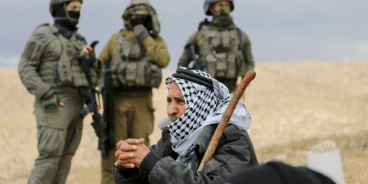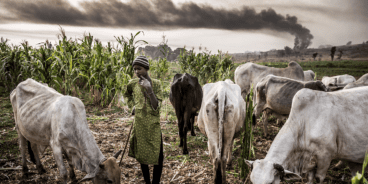
Atrocity Alert No. 54: Democratic Republic of the Congo, Central African Republic, and Women, Peace and Security
Atrocity Alert is a weekly publication by the Global Centre for the Responsibility to Protect highlighting and updating situations where populations are at risk of, or are enduring, mass atrocity crimes.
Democratic Republic of the Congo
Ongoing violence in the Democratic Republic of the Congo (DRC) is creating a widespread displacement crisis, affecting an area that extends well beyond the provinces of the eastern DRC that have been the center of recurring conflict and atrocities for more than 20 years. Insecurity caused by ethnic violence and militia attacks in the Kasaï region has resulted in more than 100,000 people being displaced during the past week.
According to the UN Office for the Coordination of Humanitarian Affairs (OCHA), the number of displaced persons in the DRC has nearly doubled since August 2016 to more than 3.7 million people, with at least 1.3 million IDPs in the five provinces of the Kasaï region. On 8 May the Head of OCHA’s office in the DRC, Rein Paulsen, noted that the expanding scope of displacement and growing inter-ethnic conflict is a cause for deep concern.
The government of the DRC must restore state authority in the affected Kasaï provinces, reduce violence and address the fears of fleeing populations. The government also needs to establish a credible investigation into the deepening crisis in the Kasaï region, including examining the more than 40 mass graves that have been discovered by the UN since January and addressing allegations of the disproportionate and deadly use of force by the security forces.
Central African Republic
Violence in the Central African Republic (CAR) is increasing, putting the lives of civilians, humanitarian workers and peacekeepers at risk of mass atrocity crimes. On 8 May a convoy of the Multidimensional Integrated Stabilization Mission in CAR (MINUSCA) was reportedly attacked by elements from an anti-balaka militia. Four peacekeepers were killed, one remains missing and several were wounded. During the first quarter of 2017 there were also 33 incidents involving the targeting of humanitarian workers, making CAR one of the most high-risk countries for aid agencies and NGOs. As a result, four major humanitarian organizations have temporarily suspended their work.
Despite the gravity of these attacks on peacekeepers and humanitarian workers, which constitute war crimes, it is civilians who continue to bear the brunt of ongoing militia violence in CAR. Civilians are regularly caught in fighting between rival militia groups or are directly targeted in ethnically-inspired killings. Perpetrators of these crimes must be held to account. In addition to stabilizing the security situation, the government, with the assistance of the international community, must make the establishment of the Special Criminal Court one of its top priorities.
Women, Peace and Security
On Monday, 15 May, the UN Security Council is scheduled to hold an Open Debate on Women, Peace and Security, focusing on sexual violence in conflict as a tactic of war and terrorism. When committed in a widespread and systematic manner, rape and sexual violence may amount to crimes against humanity, war crimes or genocide.
The UN has documented evidence of state and non-state actors perpetrating sexual violence against civilian populations in a number of conflicts during the past year, including during the government’s counter-insurgency operations in Myanmar’s Rakhine state. A UN investigation also found evidence of widespread rape near Protection of Civilians cites in South Sudan during the July 2016 violence in Juba. In addition, as noted in the 12 April 2017 Atrocity Alert, the UN has documented the Imbonerakure paramilitary youth group in Burundi perpetrating rape and other forms of sexual violence against female supporters of opposition parties. The Commission of Inquiry on the Syrian Arab Republic has also found that the so-called Islamic State in Iraq and the Levant (ISIL) has systematically committed rape and sexual violence against Yazidi women and girls, more than 1,500 of whom remain in ISIL captivity.
These are crimes under international law, regardless of who perpetrates them. Any response to sexual violence in conflict by the international community must focus on addressing the practical needs of the victims, as well as preventing further abuses by holding perpetrators accountable.
Related Publications


Atrocity Alert No. 445: Sudan, Syria and Eritrea
